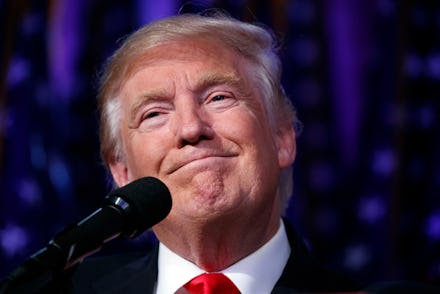Will Obamacare be repealed? Here's why the Affordable Care Act is now in serious danger.

Donald Trump will be the next president of the United States, a decision that could have long-reaching consequences for millions of people from disenfranchised communities. But there's reason to believe that it's the Affordable Care Act, the crowning achievement of Barack Obama's presidential tenure, which will be dealt one of the first blows by the Trump administration.
Since being signed into law in 2010, the Affordable Care Act — colloquially known as Obamacare — has provided access to health insurance to over 20 million Americans. But the ACA has long been a chief target for Republican legislators, who passed a bill undoing many of Obamacare's key elements in January.
The bill was vetoed by President Obama at the time, but it seems likely that such a bill would pass in a Trump presidency. Trump has repeatedly emphasized his desire to end the program, calling it a "disaster" at the second presidential debate, during which he stated, "We have to repeal it and replace it with something absolutely much less expensive." Trump then reiterated this vow to repeal the bill just before the election, saying, "We will do it, and we will do it very, very quickly. It is a catastrophe."
The 2016 election resulted in Senate Republicans holding onto a majority with 51 seats, which is less than the 60 votes needed to overcome a filibuster and fully repeal Obamacare. But "reconciliation" bills focused on spending can pass with only a simple majority in the Senate, which is the likely path that Republican legislators will take to dismantle the ACA once Trump assumes the presidency.
The Republicans' confidence in being able to take action against Obamacare was further expressed by Speaker Paul Ryan in a press conference on Wednesday, where he described the Affordable Care Act as "collapsing under its own weight."
"This Congress has already demonstrated in proving that we're able to pass that legislation and put it on a president's desk," Ryan said. "The problem is, President Obama vetoed it. Now, we have President Trump coming, who is asking us to do this. So with unified Republican government, we can fix this. We can fix these problems."
But it's unclear what Obamacare's Republican replacement will look like. The bill passed by Republicans in January presented a situation in which Obamacare's tax credits and Medicaid expansion both expired at the end of 2017, giving the government two years to put a new health care plan in place. Speaker Paul Ryan has presented an alternative health care plan on his website, which preserves Medicare and promises "more choices and lower costs."
During his campaign, Trump put forth a vague health care plan of his own that promises to "broaden health care access, make health care more affordable and improve the quality of the care available to all Americans." Putting an emphasis on the free market, Trump's proposed health care reforms would allow health insurance to be sold across state lines, allow Americans to fully deduct health insurance premiums from their tax returns and turn Medicaid into "block grants" to states paid by the federal government.
This plan, Rand Corp. forecasts, would add approximately $6 billion to the deficit in 2018, Trump's first full year in office, and will decrease the number of insured Americans by about 20 million. The Congressional Budget Office has predicted that repealing the Affordable Care Act would also cause the deficit to increase by $353 billion over 10 years.
How these health care reforms take shape still remains to be seen, but any threat to Obamacare hopefully won't go down without a fight. Ron Pollack, executive director of the liberal consumer-health lobby Families USA, told the Washington Post. "This will be the most intense fight I remember. One should never underestimate the extraordinary backlash that occurs when people have something that they really value and it is taken away."